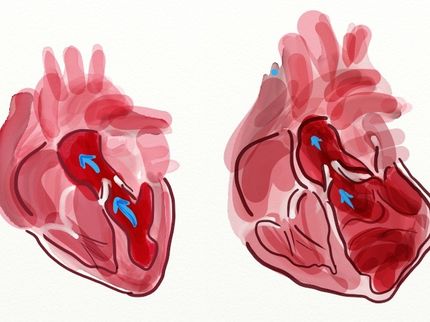A standard blood test can predict a heart attack
Using the results of a standard blood test and an online tool, you can find out if you are at increased risk of having a heart attack within six months
The tool has been developed by a research group at Uppsala University in the hope of increasing patients’ motivation to change their lifestyle.
Heart attacks are the most common cause of death in the world and are increasing globally. Many high-risk people are not identified or do not take their preventive treatment. Now researchers led by Professor Johan Sundström at Uppsala University have found that heart attacks can be predicted with a standard blood test. The problem, according to the researchers, is that risk factors have previously been verified in studies involving five to ten years of follow-up, where only factors that are stable over time can be identified.
“However, we know that the time just before a heart attack is very dynamic. For example, the risk of a heart attack doubles during the month after a divorce, and the risk of a fatal heart event is five times as high during the week after a cancer diagnosis,” says Sundström, who is a cardiologist and professor of epidemiology at Uppsala University.
Together with other European researchers, he has proceeded from the hypothesis that several important biological processes are active during the months before a heart attack and that these could be detected using a simple blood test.
“We wanted to develop methods that would enable the health services to identify people who will soon suffer their first heart attack,” Sundström says.
The research group had access to blood samples from 169,053 individuals without prior cardiovascular disease in six European cohorts. Within six months, 420 of these people suffered their first heart attack. Their blood was then compared with blood from 1,598 healthy members of the cohorts.
“We identified around 90 molecules that were linked to a risk of a first heart attack. However, the samples that are already taken in healthcare now are enough to predict the risk. We hope that this will increase people’s motivation to take their preventive medicine or stop smoking, for example,” says Sundström.
The researchers have also developed a simple online tool in which anyone can find out their risk of having a heart attack within six months.
“This was one of the aims of the entire study, since we know that people feel relatively low motivation to follow preventive treatments. If you find out that you happen to have an increased risk of suffering a heart attack soon, perhaps you will feel more motivated to prevent it,” Sundström says.
The researchers will now study the 90 or so new molecules to understand them better and see whether there are any possibilities of treatment.
“We hope to be able to carry out a new study here in Uppsala to see whether the online tool provides the kind of motivation we intend,” Sundström concludes.
One of the six cohorts is from the Uppsala-based population study EpiHealth.
Original publication
Stefan Gustafsson, Erik Lampa, Karin Jensevik Eriksson, Adam S. Butterworth, Sölve Elmståhl, Gunnar Engström, Kristian Hveem, Mattias Johansson, Arnulf Langhammer, Lars Lind, Kristi Läll, Giovanna Masala, Andres Metspalu, Conchi Moreno-Iribas, Peter M. Nilsson, Markus Perola, Birgit Simell, Hemmo Sipsma, Bjørn Olav Åsvold, Erik Ingelsson, Ulf Hammar, Andrea Ganna, Bodil Svennblad, Tove Fall, Johan Sundström; "Markers of imminent myocardial infarction"; Nature Cardiovascular Research, 2024-2-12
Most read news
Original publication
Stefan Gustafsson, Erik Lampa, Karin Jensevik Eriksson, Adam S. Butterworth, Sölve Elmståhl, Gunnar Engström, Kristian Hveem, Mattias Johansson, Arnulf Langhammer, Lars Lind, Kristi Läll, Giovanna Masala, Andres Metspalu, Conchi Moreno-Iribas, Peter M. Nilsson, Markus Perola, Birgit Simell, Hemmo Sipsma, Bjørn Olav Åsvold, Erik Ingelsson, Ulf Hammar, Andrea Ganna, Bodil Svennblad, Tove Fall, Johan Sundström; "Markers of imminent myocardial infarction"; Nature Cardiovascular Research, 2024-2-12
Organizations
Other news from the department science

Get the analytics and lab tech industry in your inbox
By submitting this form you agree that LUMITOS AG will send you the newsletter(s) selected above by email. Your data will not be passed on to third parties. Your data will be stored and processed in accordance with our data protection regulations. LUMITOS may contact you by email for the purpose of advertising or market and opinion surveys. You can revoke your consent at any time without giving reasons to LUMITOS AG, Ernst-Augustin-Str. 2, 12489 Berlin, Germany or by e-mail at revoke@lumitos.com with effect for the future. In addition, each email contains a link to unsubscribe from the corresponding newsletter.



























































